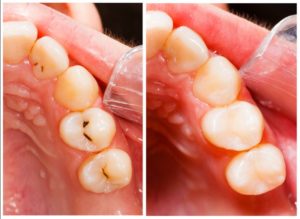 The word ‘restoration’ denotes a fresh, new start. It speaks to something that once was in a functional state that fell somehow but is given a new lease – a rejuvenating breath of fresh air. When applied to your oral health, the same ethos applies, and one common type of restoration is a dental filling. In this brief offering, your oral expert will explain a particular type – composite fillings in Marlton – and will also inform you of the warning signs to be on the lookout for.
The word ‘restoration’ denotes a fresh, new start. It speaks to something that once was in a functional state that fell somehow but is given a new lease – a rejuvenating breath of fresh air. When applied to your oral health, the same ethos applies, and one common type of restoration is a dental filling. In this brief offering, your oral expert will explain a particular type – composite fillings in Marlton – and will also inform you of the warning signs to be on the lookout for.
What is a Filling?
A filling is a way to restore a tooth damaged by decay back to its normal function and shape. The process involves the following:
- The first step is to remove the decayed tooth material.
- The next step is to thoroughly clean the affected area.
- Then your dentist will pack the cleaned-out cavity with a filling material.
Your tooth will then be returned to its normal function.
What is a Composite Filling?
One of the more common types of fillings used now is the composite filling. It is composed of plastic resins and crafted to match the natural color of your teeth, which is a vast improvement from the days when the only option was the amalgam filling, which sports a silvery color and lets the world know that you’ve had restorative work done.
Another advantage of the composite filling is that the ingredients are mixed and placed directly into the cavity, where they are hardened using heat. This type of application also provides for a stronger bond and leaves less of a chance for bacteria to seep into the area again.
Signs That You May Need a Filling
Here are some signs to be on the lookout for, signaling that you may need a filling:
- Sensitivity to extreme temperatures, pressure or sugary foods
- Toothache
- Sharp or throbbing pain
- Pain when biting or chewing
- A hole or dark spots on the tooth
- Floss keeps tearing in a particular spot
- Lost filling
- Food consistently gets stuck between teeth
How to Prevent Decay
Once your tooth is restored to normal, you definitely don’t want to walk back down the road to decay again. To protect it, pay close attention to your oral hygiene habits. Are you brushing and flossing at least twice a day? Next, be sure to maintain regular visits with your dentist for checkups and cleanings to ensure that no danger is encroaching and to remove any bacteria and tartar that you haven’t been able to with your cleaning habits.
So if there’s been a void in your oral care, fill it today by reaching out to your dentist in Marlton to schedule your first appointment!
About the Author
Dr. Kristin B. Petulla earned her DDS degree from the University of Maryland School of Dentistry. In addition, she has completed advanced training at the prestigious Las Vegas Institute. A current affiliate of the American Dental Association and several other professional organizations, Dr. Petulla can be reached for more information through her website.
